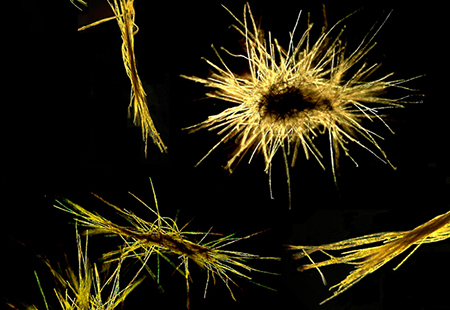Colonies of the single-celled phytoplankton Trichodesmium (Photo by MIT/WHOI Joint Program student Abby Heithoff)
Research by the University of Liverpool has found that climate change is affecting the tiny bacteria – cyanobacteria – that form the foundation of the ocean’s food chain.
The study found that rising temperatures and levels of atmospheric carbon dioxide is leading to certain strains of nitrogen-fixing cyanobacteria being eliminated.
Two major groups
The scientists studied the two major groups of the nitrogen-fixing cyanobacteria:Trichodesmium, which forms large floating colonies big enough to see with the naked eye which make vast blooms in the open ocean, and Crocosphaera, which is also very abundant but is a single-celled, microscopic organism.
Previous research has shown that these two types of cyanobacteria should benefit from climate change, thriving in high CO2 levels and warmer oceans. However, these studies only examined one or two strains of the organisms.
Nitrogen-fixing occurs when certain special organisms like cyanobacteria convert inert – and therefore unusable – nitrogen gas from the air into a reactive form that the majority of other living beings need to survive. Without nitrogen fixers, it would not be possible for life in the nutrient-poor regions of the ocean to survive for long.
Dr Alessandro Tagliabue, from the University’s School of Environmental Sciences who was part of the research project, said: “We found that there is not one single response of these organisms to rising CO2 levels in the ocean, which highlights the extreme biodiversity present and how fossil fuel emissions may shape ocean ecosystems in unforeseen ways. Impacts on ocean food chains and resources are highly likely, but difficult to assess at present.”
Some strains grow better
David Hutchins, Professor of Marine Environmental Biology at the University of South California Dornsife College of Letters, Arts and Sciences who led the research, said:”It is not that climate change will wipe out all nitrogen fixers; we’ve shown that there’s redundancy in Nature’s system. Rather, increasing atmospheric carbon dioxide changes specifically which nitrogen fixers are likely to thrive and we’re not entirely certain how that will change the ocean of tomorrow.”
The study used USC’s unique culture library of strains and species of marine phytoplankton to show that some strains grow better at the low CO2 levels not seen since the start of the Industrial Revolution, while others will thrive in the future greenhouse ocean.
This research was funded by the National Science Foundation and published in Nature Geoscience.

